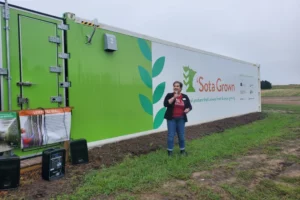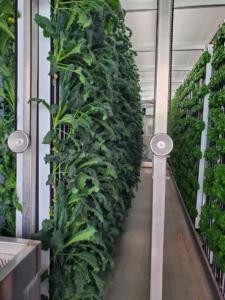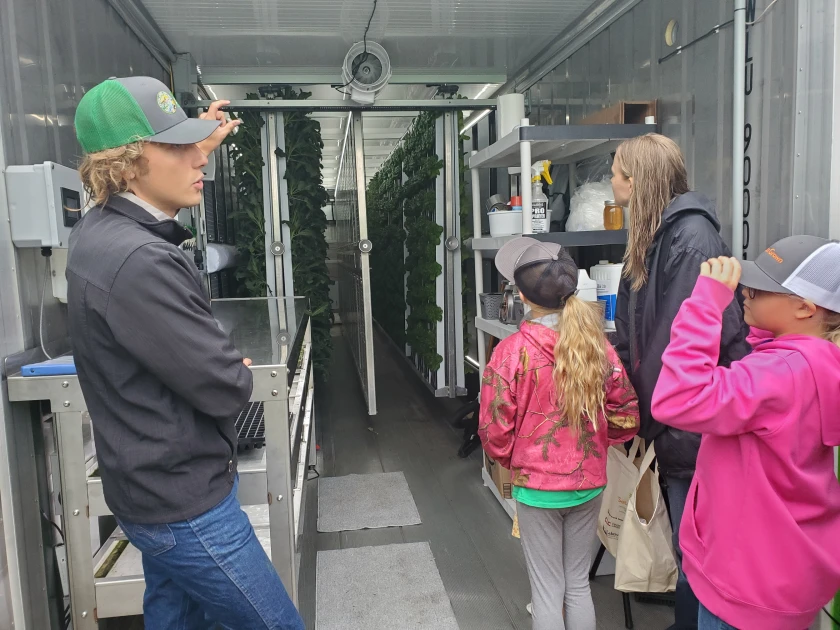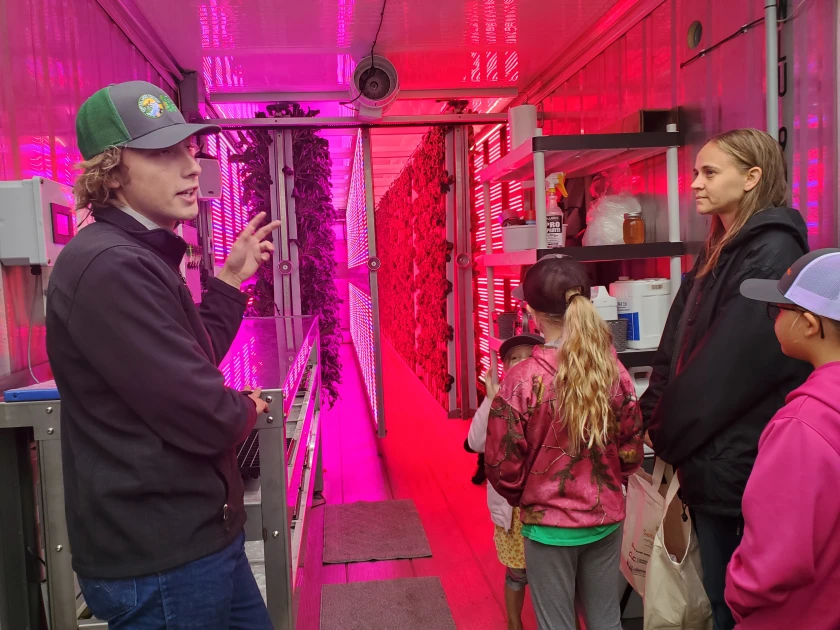Fresh Food for All: ‘Sota Grown Project Grows Indoor Veggies at CLC
August 29, 2021
Staples, Minnesota – Year-round healthy food production is happening at Central Lakes College, thanks to a community collaboration.
Even when the temperature inevitably drops to below zero during the winter, kale, lettuce and other leafy greens will continue growing in the ‘Sota Grown indoor food production container at the Ag & Energy Research Center at CLC’s Staples campus, feeding those in need in the community.

“Today is an incredibly exciting day to see the research that this has now brought to our area,” CLC President Hara Charlier said during a ribbon cutting ceremony for the project Friday, Aug. 27. “And we’re honored to be the home of the pod that has been so lovingly cared for for this past year.”
‘Sota Grown is a project stemming from the Electric Power Research Institute, an international nonprofit that researches and evaluates how technology and energy come together in terms of generation, transmission, distribution, use and impact. The indoor food production container at CLC is one of 14 pods spread throughout the country.
“The work being done is being looked at throughout the U.S. — hopefully soon throughout the world,” Frank Sharp, principal technical leader at Electric Power Research Institute, said Friday. “… Those learnings that you all have are being shared, and then the learnings that we have in other locations are coming back here, and we have achieved that by growing the same product.”
The various containers are in different climates — with another cold-weather pod in Brookings, South Dakota — and will help researchers determine how energy and water use differs in the varying climates.
Great River Energy, an electric transmission and generation cooperative headquartered in Maple Grove, provides power to Todd-Wadena Electric Cooperative, which is the local host for the ‘Sota Grown pod at CLC.

“Fostering concern for a community and advancing innovative technology are always top of mind for us, and this project combines both of those things,” said Mark Fagan, vice president and chief corporate and member services officer at Great River Energy. “… Indoor food production presented a new opportunity to demonstrate how efficient electricity and technology can work together to create ideal conditions for plant growth, yield and consistency.”
For Todd-Wadena Electric Cooperative, the project is a way to collect data and find better ways to serve customers in the future while also supporting the agriculture industry.
“Todd-Wadena Electric Cooperative was built by our local farmers, and our agricultural community is still very important to our cooperative,” member and Energy Services Manager Allison Uselman said. “… Of course, this technology will never replace traditional farming, but it is a way to positively supplement it. So we hope that we can use this project to potentially support this local ag community in the future.”
Not only does the project impact the agricultural and energy industries, Uselman said, but it impacts local education and health care as well.
As a member of the Minnesota House of Representatives Education Policy Committee, Rep. John Poston, R-Lake Shore, hopes to use the ‘Sota Grown project to bring more agricultural studies to the classroom for younger students, thus investing in the future of agriculture, which he said has a lot to do with technology and input from younger generations.
“You can imagine that these could be used in some pretty interesting settings to do some really good work,” Poston said of the pod Friday.
The health care industry also benefits from the ‘Sota Grown project, as the vegetables grown in the container go to Lakewood Health Systems, which distributes it to those in need throughout the community. The healthy foods make their way to those of all ages — from children up to seniors using the Meals on the Wheels program.
About 8% of Lakewood’s patients experience food insecurity, Community Health Director Alicia Bauman said, and about 12% of school-aged children experience food gaps at home.
“So projects like ‘Sota Grown really help bridge the gap to accessing those healthy, nutritious foods for the families that we serve,” Bauman said.
Noah Boelter, a research analyst at Central Lakes College, talks to visitors about indoor food production happening at the Staples CLC campus Friday, Aug. 27, 2021. Boelter turned on the food pod’s LED lights, which are the only source of heat required, even in the winter. Theresa Bourke / Brainerd DispatchIndoor food production, also known as container farming or vertical farming, uses technology, plant sciences and controlled environments to create microclimates. The ‘Sota Grown container is hydroponic — meaning plants grow in a nutrient solution rather than in soil — and allows the plants to grow all year round, no matter the outside climate.
The temperature stays at roughly 68 degrees in the pod, which is equipped with LED lights that provide all the heat necessary for the veggies to grow.
A dehumidifier draws water from outside to use in the pod, while the winter months require a water tank to be filled periodically.
About 200 kale seedlings are planted weekly, and the container uses about 7-7.5 gallons of water a day, which Sharp compared to about three or four quick hand washes.


